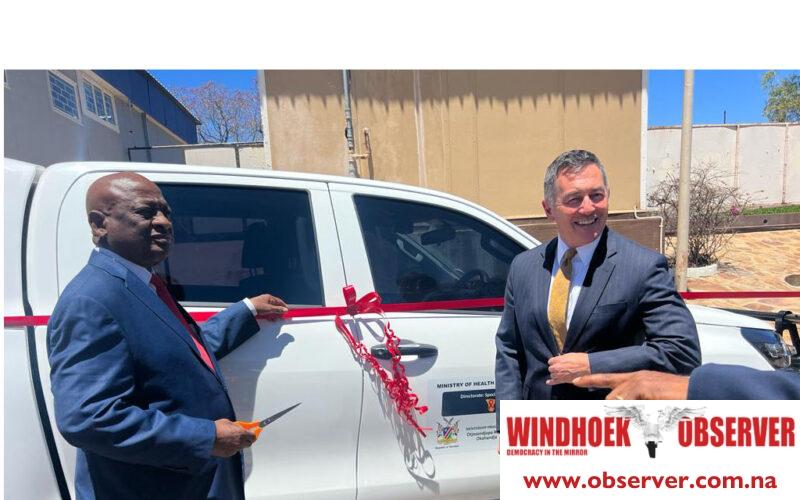Niël Terblanché
Namibia’s healthcare system received crucial support in the form of 16 new vehicles that were generously donated by the Government of the United States of America.
The Minister of Health and Social Services, Dr Kalumbi Shangula, officially took ownership of the new vehicles that will be added to the fleet already supporting the Mentorship Programme.
During the ceremony, Dr. Shangula expressed his gratitude and stressed the importance of this donation in enhancing the quality of healthcare through the mentorship programme.
He also pointed to the critical role played by the Centers for Disease Control and Prevention (CDC)-Namibia and the U.S. President’s Emergency Plan for AIDS Relief (PEPFAR) in supporting Namibia’s healthcare initiatives.
The Mentorship Programme was established in 2015 as part of an acceleration plan to achieve HIV epidemic control by 2030, aligning with UNAIDS Fast Track Targets. Clinical Mentors, funded by CDC, offer support to healthcare workers engaged in the national HIV response.
These mentors serve as experienced clinician-trainers, providing on-site training, and consultations on complex cases, and enhancing problem-solving, diagnostic, and decision-making skills. Additionally, they lead case discussions, address quality assurance issues, and promote continuing education.
The programme began with the first fleet of eleven mentorship vehicles delivered in November 2016 to regions across Namibia, enabling the provision of essential HIV services in remote communities.
In February 2020, the programme expanded to include Omaheke, Kunene, and Hardap Regions, accompanied by an additional six vehicles, strengthening the Ministry’s decentralized approach to HIV service delivery.
Yesterday, the U.S. Government officially handed over sixteen new vehicles, providing a substantial boost to the Mentorship Programme’s capacity.
These vehicles will transport mentor teams, facilitating their day-to-day activities, supporting meetings across the country, and assisting other programs like differentiated service delivery and the Namibian Treatment Adherence Supports.
Dr. Shangula highlighted the achievements of the mentorship programme, including the decentralization of HIV service delivery to primary health care clinics, successful implementation of the “TEST and TREAT” guidelines, and transition to advanced regimens for adults and children living with HIV.
The programme has also played a crucial role in ensuring continuity of care during the COVID-19 pandemic.
The Minister expressed his gratitude to the U.S. Government and CDC-Namibia for their unwavering support, emphasizing the transformative impact of mentorship in achieving excellence in healthcare.
The U.S. Ambassador to Namibia, Randy Berry, stressed the immense geographical challenges of providing healthcare services in Namibia and acknowledged the dedication of healthcare providers.
He accentuated the importance of vehicles in reaching remote clinics efficiently, facilitating mentor visits, and ensuring that quality healthcare reaches even the most distant areas.
Ambassador Berry reaffirmed the U.S. Government’s commitment to supporting Namibia’s healthcare system, citing over US$1.5 billion in funding provided through PEPFAR over the past 18 years.
He stressed the importance of practical assistance such as vehicle donations, which are essential tools for healthcare providers to reach patients.
Ambassador Berry commended the role of Potentia Namibia in facilitating the purchase of the new vehicles and driver recruitment, urging the drivers to prioritize safety. He also acknowledged the tireless efforts of clinical and nurse mentors and healthcare providers in remote areas, assuring continued support.
He said the handover of these vehicles signifies a crucial step toward enhancing healthcare delivery and mentorship in Namibia, bridging the gap between dreams and reality in the nation’s pursuit of improved public health. The Mentorship Programme’s impact on the UNAIDS cascade, reaching 95-97-94 earlier this year, stresses the significance of mentorship and its role in shaping a healthier future for Namibia.




